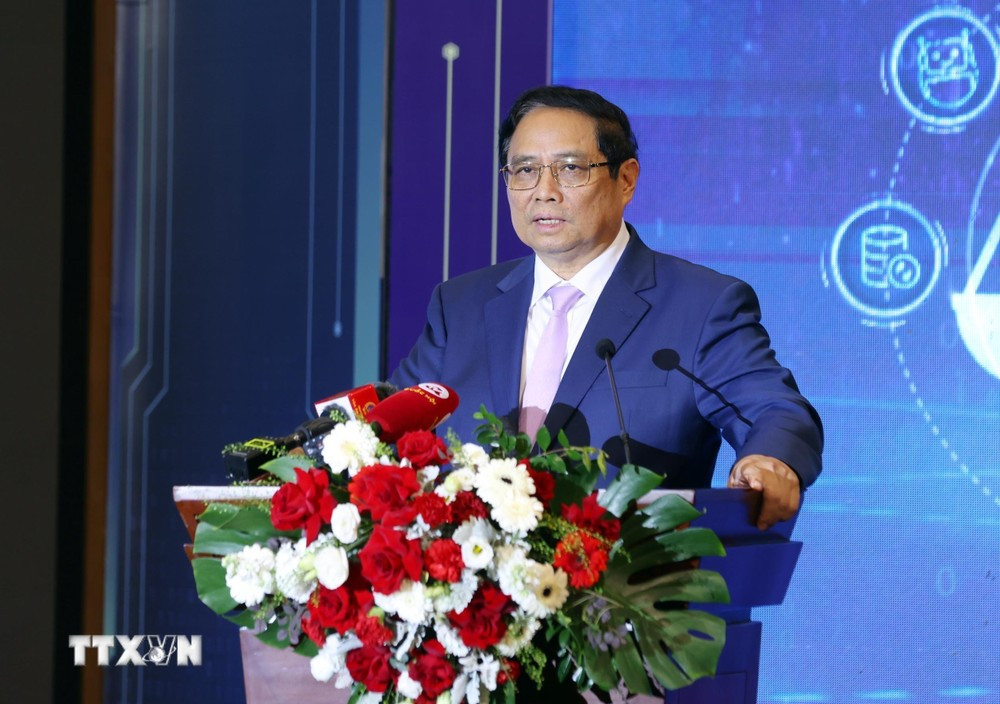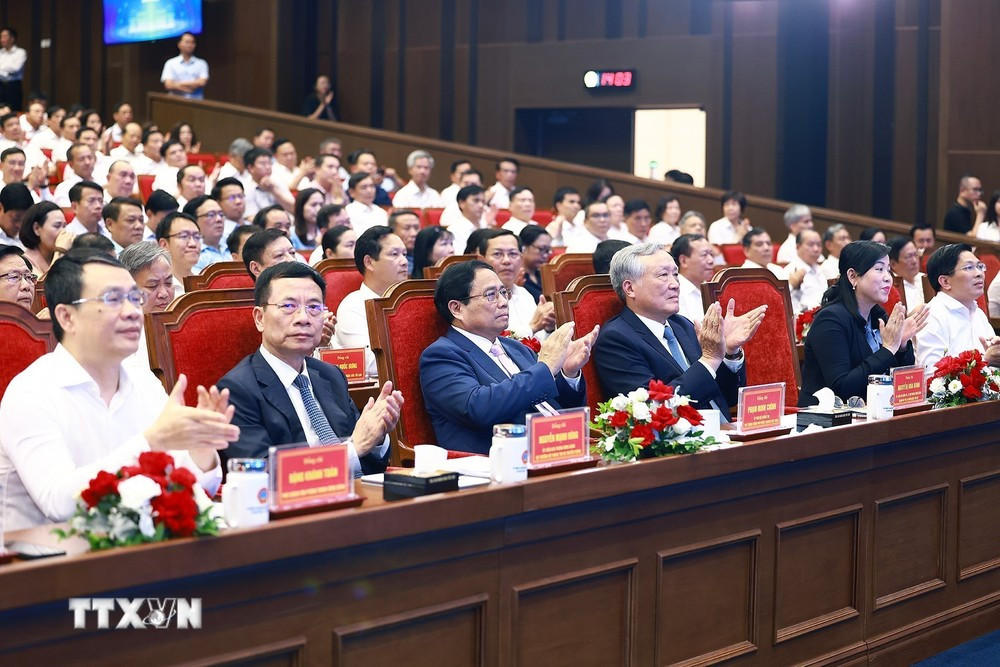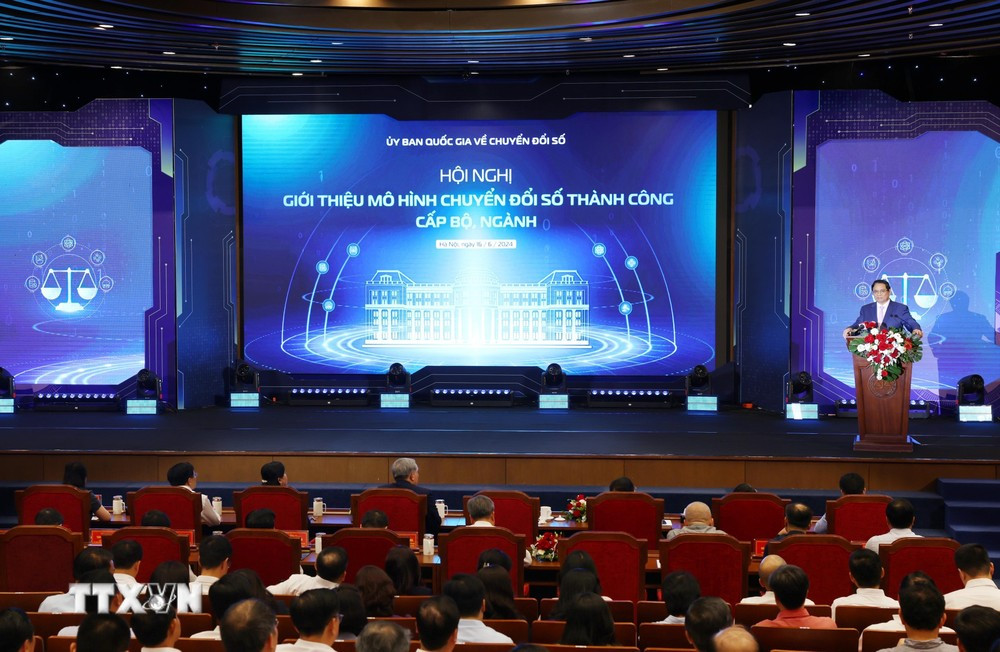The Prime Minister requested the judiciary to strongly promote digital transformation and build e-courts with the spirit of "5 pushes", including promoting the improvement of institutions, mechanisms and policies in digital transformation.

On the afternoon of June 16, Politburo member, Prime Minister Pham Minh Chinh, Chairman of the National Committee on Digital Transformation attended a conference to introduce the successful digital transformation model at the ministerial and sectoral levels of the People's Court sector.
The conference, organized by the Supreme People's Court, connected online with more than 800 people's court points at all levels nationwide.
Also attending the conference were Politburo member, Secretary of the Party Central Committee, Chief Justice of the Supreme People's Court Nguyen Hoa Binh; leaders of ministries, central agencies and the judiciary.
At the conference, delegates were introduced to the digital transformation framework at the ministerial and sectoral levels; the results of digital transformation work of the people's court sector and the direction and tasks for the coming time; and lessons learned from the success of digital transformation of the court sector.
The conference also heard presentations on the topics of “online trials, a breakthrough in judicial reform of the court system,” “Virtual assistants - a powerful tool for judges,” “Managing litigation activities on digital platforms contributes to improving the efficiency of court operations,” etc.
In particular, the conference was able to watch live some online trials taking place in some localities.
Implementing the Resolutions of the Central Committee and the Politburo on building the judiciary in general, the people's court sector in particular and the National Digital Transformation Program, in recent times, the people's court sector has actively deployed digital transformation in the judicial and adjudication sectors, contributing to improving the efficiency of the sector's operations.
The sector has deployed the construction of many digital platforms for litigation management, work management, direction and operation, personnel management, case file management and storage, asset management, online meetings and conferences, statistics, synthesis, monitoring of court information on cyberspace and monitoring and operating people's court activities...

The judiciary has promoted digital transformation to provide public judicial services in a modern, convenient, economical, public and transparent manner in the electronic environment; deployed many online public judicial services on the National Public Service Portal, with more than 1.4 million judgments and decisions published and serving more than 180 million accesses for search and exploitation.
Along with that, online trials have been deployed in courts at all levels, bringing many practical benefits to people and society.
Since the beginning of 2022, people's courts at all levels have coordinated with prosecution agencies to organize online trials for nearly 20,000 cases, saving about 100 billion VND.
The judiciary has initially applied artificial intelligence and built virtual assistants to support judges; has integrated over 168,000 documents, over 1.4 million judgments, over 24,000 answers to legal situations. To date, there have been over 5.7 million questions and answers, an average of 10,000-15,000 per day.
Speaking at the conference, Prime Minister Pham Minh Chinh emphasized that our Party and State always pay special attention to and clearly identify digital transformation as an important political task, an inevitable trend and an objective requirement in the cause of national development, construction and protection of the Fatherland. Digital transformation is a task that is both long-term strategic and requires regular monitoring, evaluation, urging, close direction and drastic, effective and substantial implementation.
“Vietnam has determined that digital transformation must be for all people, comprehensive, with people as the center, subject, goal, driving force, and resource. Therefore, digital transformation has gone to every alley, knocked on every door, and reached every subject,” said the Prime Minister.
According to the Prime Minister, Project 06 is a key and important task of national digital transformation, serving as a basis for transforming the way of life, work and production and business methods of people and enterprises based on digital technology.
In recent times, the national digital transformation work has been focused on and has had very positive changes, achieving many important results.
National digital transformation platforms are consolidated and developed in all 6 aspects: Digital institutions, digital infrastructure, digital data, digital services, digital skills, and ensuring network security and information security.
To date, 81.7% of households use fiber optic broadband internet, 100% of communes, wards and towns have fiber optic internet connection; 82.9% of mobile subscribers have used smartphones.
The national population database has been connected and shared with 18 ministries, agencies and 63 localities. 763/1,084 (over 70%) administrative procedures and citizen papers related to population management have been simplified. More than 4,500 online public services have been provided on the National Public Service Portal.
Currently, 77% of adults have bank accounts and over 1 million policy beneficiaries have received social security benefits through their accounts. E-commerce, cashless payments, and electronic invoices are being strongly deployed. There are currently 8.2 million customers using Mobile Money.
Project 06 has provided 25/25 essential public services, saving the State and society nearly 3,500 billion VND/year. Pilot implementation of electronic criminal record certificates in Hanoi and Thua Thien-Hue. Up to now, 100% of students have submitted applications and considered for priority points through population data; 100% of medical examination and treatment facilities have cashless payment services...
Stating that the construction of electronic courts has always been identified as one of the key and continuous tasks in the judicial reform process - an urgent task for the court system to improve its operational efficiency, strengthen people's trust in the law, justice and the superiority of our regime, the Prime Minister acknowledged, highly appreciated and congratulated the achievements of the sector, especially in digital transformation; contributing significantly to the fight against crime, maintaining political security, social order and safety, protecting justice, worthy of the trust of the Party, State and People.
The Prime Minister also frankly pointed out a number of difficulties and challenges in national digital transformation in general and digital transformation of the people's court sector in particular, such as the slow construction and completion of institutions to serve digital transformation; the reduction and simplification of administrative procedures have not met the needs. The quality of online public judicial services is not high; digital infrastructure has not met the development needs; connection, integration, data sharing, and data digitization still have many limitations; network security and information security in many places have not received due attention...

Pointing out many lessons learned from practice, the Prime Minister said that we must consider adjudication as the center, litigation as a breakthrough and digital transformation as an important tool to support the implementation of justice; always improve the capacity of court administration on a digital platform; provide people with many convenient judicial services, build the image of the court as a true support for the people in protecting justice. Digital transformation aims to improve the quality and accuracy of judgments; prevent injustice, mistakes, and criminals from escaping, ensuring empathy, reason, humanity, and persuasion; build an increasingly modern people's court sector, progressing together, catching up with the development trends of the world.
According to the Prime Minister, in the coming time, the world situation is forecast to continue to change rapidly and complicatedly; in general, there will be more difficulties and challenges than opportunities and advantages. The negative factors of the market economy and integration will have increasingly profound impacts, especially in the conditions that our country is a developing country, the economy is in transition, the scale is modest, the openness is high, and the resilience is limited. Therefore, the tasks set for the People's Court sector are very important, very glorious but also very heavy.
Wishing that the judiciary continue to promote its fine traditions, strive to overcome difficulties and challenges, uphold its sense of responsibility, and well implement President Ho Chi Minh's teachings - "Serving the public, upholding the law, being impartial and impartial," and excellently completing all assigned tasks, the Prime Minister requested the judiciary to continue to promote digital transformation, considering it one of the most important tools, the most effective and efficient support in all aspects of the work of the People's Court.
Prime Minister Pham Minh Chinh requested the court sector to continue to strongly promote digital transformation and build e-courts with the spirit of "5 pushes". These are: Accelerating the completion of institutions, mechanisms and policies in digital transformation and building e-courts; Accelerating the development of digital infrastructure and digital platforms to create an important premise in building e-courts and ensuring network security and information security in all situations; Accelerating the creation of digital data, integration, connection, interconnection, continuous, smooth and synchronous sharing to improve the governance and enforcement capacity of courts on digital platforms; Accelerating the development of digital human resources, digital skills and professional training to meet the requirements of developing e-courts; Accelerating extensive propaganda in the people's court sector so that all cadres, civil servants and judges unanimously respond to and participate in the process of digital transformation and building e-courts.
The Prime Minister requested to focus on perfecting institutions and policy mechanisms to promote digital transformation in the people's court sector and develop e-courts. In particular, the sector should promptly submit to the National Assembly for approval the Law on Organization of People's Courts (amended) and the Civil Procedure Code (amended), creating a premise for online litigation activities; regulations on electronic evidence; scientific basis and legality of electronic evidence recovery, functions, tasks and powers of subjects conducting electronic litigation.
Along with that is the innovation of the operating model to digital-based management; increasing publicity and transparency of court activities, especially on the Supreme People's Court's Electronic Information Portal and the websites of high-level people's courts and courts at all levels; improving the capacity of court administration and enforcement on digital platforms; promoting the modernization of the people's court sector, especially the development of digital infrastructure; building data centers, digitizing records, integrating and sharing information and data; striving for 100% of the work areas of the people's court to be converted and uniformly managed on digital platforms.
The Prime Minister proposed to promote the exploitation, use and development of online trial platforms towards 100% of people's courts meeting the conditions in terms of equipment and human resources to organize online trials; promptly study and propose to perfect the legal foundation on electronic litigation; promote simplification and restructuring of administrative procedures to improve the quantity and quality of online public judicial services.
In addition, the industry needs to simplify administrative procedure settlement records for people; research integration with personal identification applications to help people easily access and use services anytime, anywhere without having to go directly to court.
The Prime Minister hopes and believes that the people's court sector will continue to synchronously and effectively implement the task of digital transformation and build e-courts in the spirit of Resolution No. 27/NQ-TW of the Central Committee, contributing to the successful implementation of the goals and requirements set forth in the Resolution of the 13th National Party Congress: "Building a professional, modern, fair, strict, honest, serving-the-Fatherland and-the-people Vietnamese judiciary".
TB (according to VNA)